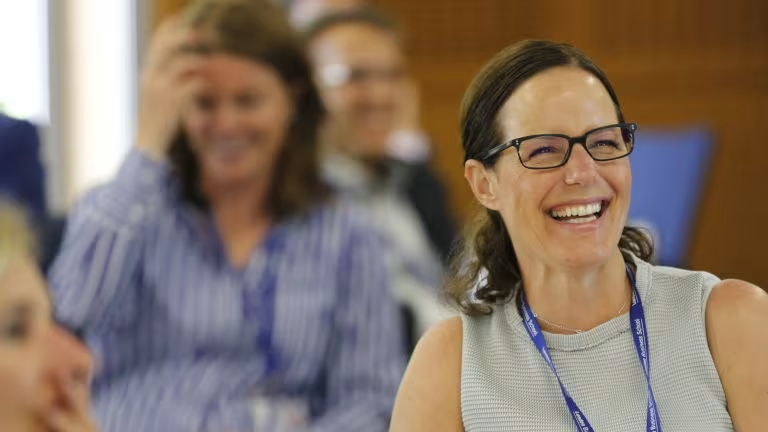A sudden end to years in the closet
While I was travelling, I ended up working for my first ever female role model. She was the first senior women I’d really been exposed to, and I found her so inspirational, I decided I would go back after all. I knew this time things had to be on my own terms.
It was around this time that I started to date women. I didn’t want to open up about my sexuality in that environment, but it was a strain. When you’re trying not to out yourself it makes sense to remove yourself from most office chit-chat, but this can make you seem distant or not very approachable. I was in the closet for many, many years. In fact, I didn’t come out until 2007. I remember it quite clearly: I was in Zurich in Switzerland, and we'd just been subject to a hostile takeover which we’d been fighting for months. It was becoming clear that we were going to lose, which of course meant my team were all petrified about their jobs. I had to be incredibly strong for them, even in the middle of a media blitz and through all this uncertainty. Once it was over, I was talking to someone at dinner and they told me they didn’t know how I’d survived with having no-one to go home and offload or cry to. In that moment I realised I’d been lying to all these people – so much so that they were feeling sorry for me when I was actually in a happy relationship. I told myself that was ending right then. At my next job interview I just blurted out that I was in a lesbian relationship. The man interviewing me just said that was great, and that he hoped to meet her one day. I got the job.
Once I was “out”, I realised how much effort it had taken to hide my sexuality. I felt better equipped to do my job, because I wasn’t wasting all that energy. Of course, not everyone was completely on board. When I first became CEO of Lloyd’s in 2014, I was shocked by the culture – bear in mind they’d only been accepting females on the trading floor since the 1970s, after nearly 300 years of an all-male workforce. I remember walking through the trading floor and marvelling at how all these men – regardless of their age – looked exactly the same as each other in their suits and ties.
A taboo-busting CEO
Not only was I the first female CEO they’d had, but I wasn’t afraid to use words that had previously been taboo. I started talking openly about not seeing many gay, lesbian, or bisexual staff members – I think some people thought it was all just too much for that audience. Despite the criticism, I kept going. I knew I was on to something, so I kept talking. Slowly, related employee resource groups started springing up. I hadn’t hired a D&I consultant, so these grassroots movements were really my only support. Finally, people were coming together and properly discussing LGBTQ+ issues.
I will always remember the night we formally launched our LGBT network. It was a real celebration and we even had someone from Stonewall speaking. I remember looking at her and thinking wow, we’ve got somebody like this in the Lloyd’s offices. A member of staff approached me with a tear in his eye and told me he never thought he would see a moment like that at Lloyds, not in his whole 30 years there. It was a moment of such joy – I was sure he was about to come out. But what he actually said was that his son was gay, and he’d been avoiding talking about it because he was afraid of people’s reactions. Conversations like that remind me how the things we do in the workplace can seep out into our personal lives.
What does the future look like for inclusive organisations?
Now, more than ever, businesses have a duty to drive progress. Not only that, but society actually expects businesses to do the right thing, and CEOs to have an opinion. Previously, CEOs were very corporate, and all their communications were managed by a team, but now they need to be able to connect with their customers to build trust. Our smallest actions can have an enormous impact. If we want to change the world, we need to visibly challenge the status quo and be prepared to be outspoken advocates.
I was also careful to pick spokespeople from across the organisation, so it wasn’t always only me talking about LGBTQ+ issues. No one person can talk from experience about such a broad set of experiences, and I didn’t want to be the sole focus of our conversations.
After my girlfriend and I broke up after 12 years, I ended up with a man. Suddenly I was labelled as being bisexual and was being asked to put myself forward for recognition as bisexual – which was strange to me as I never went out seeking labels. Still, I wanted to be a force for change, so I put myself forward. Of course, there were some nasty comments and who can say if Lloyd’s suffered because of my approach. All I know is that I’m immensely proud of how successful we were during my time there. We completely modernised out approach to technology, in part because we were able to hire a diverse mix of talented people, who felt comfortable enough to be themselves and just focus on getting the job done.
I would urge anyone working today, whatever your role, to search for the courage to speak up for what’s right. Whether that means calling out inappropriate behaviour or being curious enough to really listen when people share their experiences and embracing their perspectives. Be a bull in a China shop but be smart about it.









